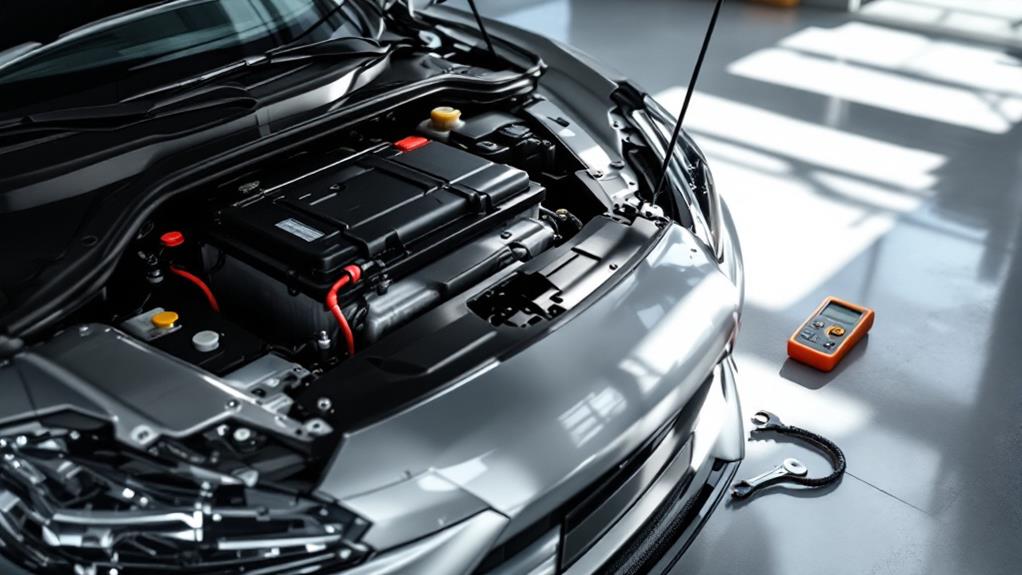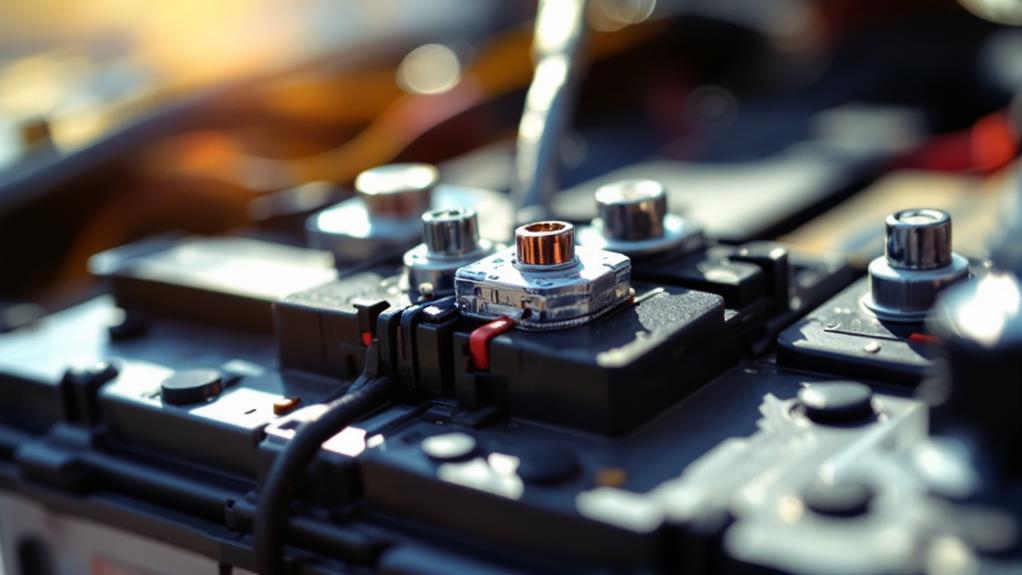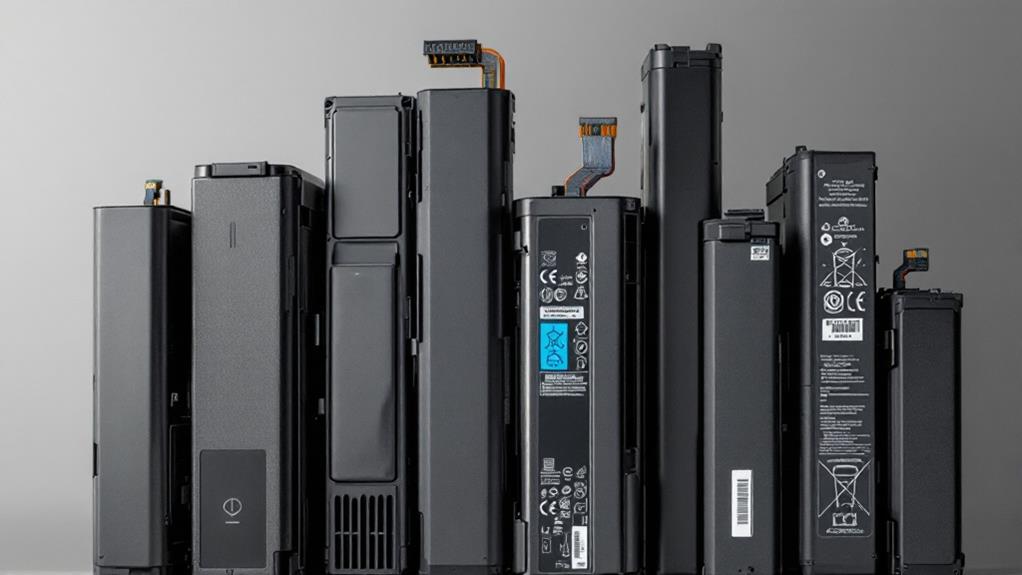Top Tips to Maximize Your Car Battery Life and Keep Your Vehicle Running

To maximize your car battery life and keep your vehicle running smoothly, monitor your battery's health regularly and test its voltage. Keep drives longer to guarantee the battery gets recharged, and turn off the engine during lengthy stops. Check and clean battery terminals to maintain strong connections, and use a smart charger to improve charging habits. Protect your battery from extreme temperatures with insulation or by parking strategically. These simple measures can greatly extend your battery's lifespan and improve vehicle reliability. For further ways to elevate your car's performance and longevity, investigate additional information.
Monitor Battery Health
Keeping an eye on your car battery's health is vital to avoid unexpected breakdowns and guarantee your vehicle runs smoothly. Regular battery testing is a proactive measure you can take to verify your battery's longevity. You don't want to find yourself stranded because of a dead battery, so take advantage of the tools available to monitor its condition.
Start by performing a voltage check with a multimeter. This simple device helps you measure the battery's voltage level and determine if it's operating within the ideal range. Typically, a fully charged car battery should read around 12.6 volts or higher when the engine is off. If the reading is notably lower, it might be time to contemplate a replacement.
Many auto parts stores offer free battery testing services, so take advantage of these to get a professional assessment. They can help identify any underlying issues that might affect your battery's performance. Keep in mind that extreme temperatures, both hot and cold, can impact your battery's health, making regular checks even more important. By keeping tabs on your battery's condition, you'll guarantee your vehicle remains reliable, giving you peace of mind on the road.
Limit Short Drives
Frequent short drives can considerably shorten your car battery's lifespan. When you drive short distances, your battery doesn't get enough time to recharge fully. Increasing your drive frequency without allowing the battery to recharge can lead to a drained battery. To maintain your car battery's health, consider reducing the number of short trips. Instead, try to combine errands into a single trip. This not only saves your battery but also your time and fuel.
Here's what you can do to limit the impact of short drives:
- Plan your trips: Combine multiple errands into one longer drive.
- Avoid engine idling: Turn off the engine if you expect to stop for more than a minute.
- Use alternative transport: Walk or cycle for very short distances.
- Keep the battery charged: Invest in a battery charger to maintain charge levels, especially in cold weather.
- Regular maintenance: Check your battery and electrical system regularly to catch potential issues early.
Secure Connections

Loose or corroded battery cables can wreak havoc on your car's electrical system. Confirming secure connections is vital for maintaining a reliable vehicle. Start by regularly inspecting your battery terminals for signs of battery corrosion. This corrosion appears as a white or greenish powder on the terminals and can interfere with the flow of electricity, leading to a weak or dead battery.
To prevent these issues, it's important to practice proper connection maintenance. Begin by cleaning the terminals using a mixture of baking soda and water, which neutralizes the acid. Use a brush to scrub away the corrosion gently, and then rinse with clean water. Make certain everything is dry before reconnecting the cables. Always tighten the clamps securely to guarantee a stable connection.
Routine checks on your battery connections help you catch potential problems early. Look for loose cables or corroded parts and address them promptly. This proactive approach not only extends the life of your battery but also prevents unexpected breakdowns. By staying vigilant and committing to regular maintenance, you can keep your car's electrical system in top shape, assuring smooth and reliable performance every time you drive.
Optimize Charging Habits
Improve your car battery's lifespan by optimizing your charging habits. Proper battery maintenance isn't just about checking connections; it's also about how you charge. Avoid frequent short trips that don't allow your battery to recharge fully. Instead, aim for longer drives that adequately recharge your battery. Keeping the charge level between 20% and 80% can prevent overcharging and deep discharges, both of which harm your battery.
Consider using quality charging accessories to maintain your battery's health. A reliable charger can make a significant difference in guaranteeing your battery gets the right amount of power.
Here are a few tips to help you optimize your charging habits:
- Use a smart charger: Invest in a smart charger that automatically adjusts the charging rate depending on the battery's needs.
- Avoid idling: Letting your car idle frequently can drain the battery without giving it a chance to recharge.
- Schedule regular checks: Regular maintenance checks help catch potential issues before they worsen.
- Limit electrical accessory use: Reduce the use of lights, radio, and other accessories when the engine is off.
- Keep terminals clean: Clean battery terminals promote better charging efficiency.
Protect From Extreme Temperatures

Extreme temperatures can wreak havoc on your car battery, shortening its lifespan considerably. Both scorching heat and freezing cold can lead to battery failure if you're not careful. It's crucial to take steps to protect your battery from these extreme conditions, guaranteeing your vehicle stays reliable when you need it most.
Start by considering insulating materials. These are designed to wrap around your battery, providing a barrier against temperature extremes. Battery insulation kits are available and can be an effective way to maintain temperature regulation. They help keep the battery warm in the winter and cool in the summer, reducing the risk of sudden failure.
Parking your car in a garage can also aid in temperature regulation. A garage buffers your vehicle from direct exposure to harsh weather. If a garage isn't an option, try to park in shaded areas during hot months and away from wind exposure in cold months.
Lastly, regularly check your battery's health. Cold weather can cause the battery to discharge quicker, while heat can evaporate critical battery fluids. Keeping up with maintenance will guarantee your battery performs efficiently, regardless of the weather outside.



